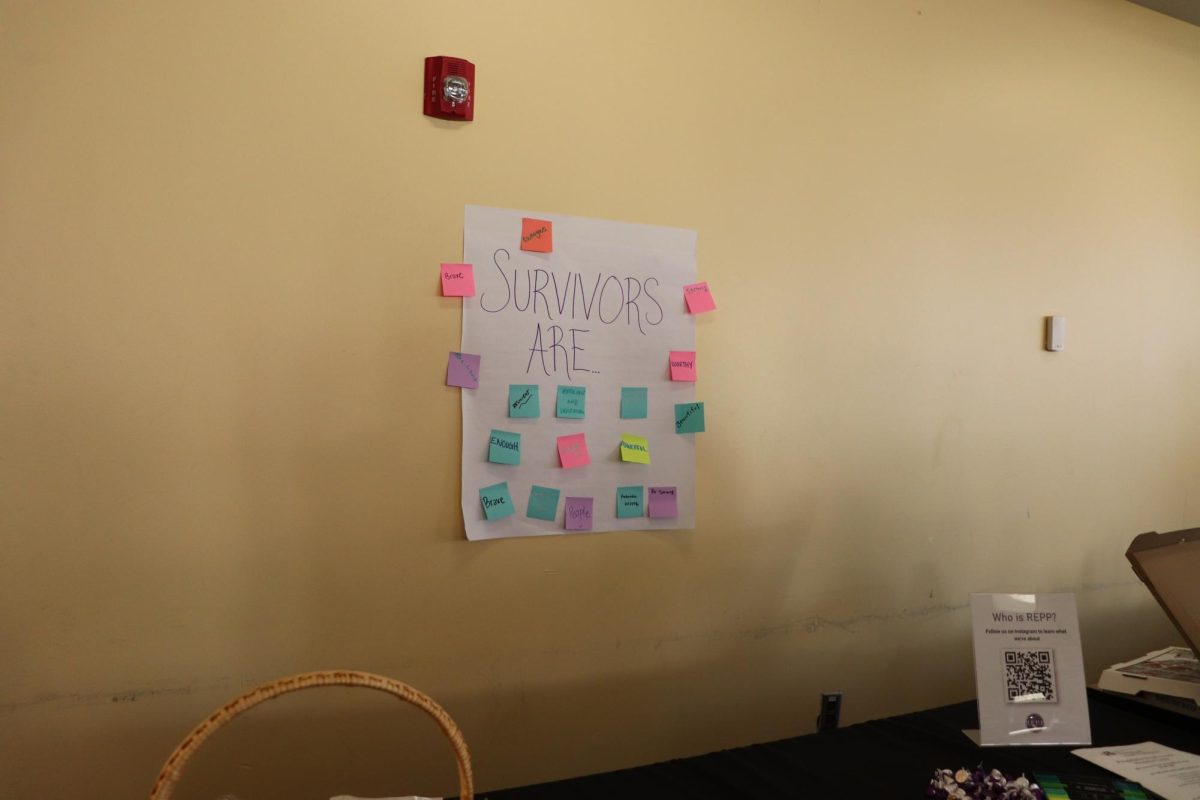
A poster at the Take Back the Night event featuring sticky notes from students with encouraging words to describe survivors. PHOTO: GRACE O’MEARA ’27/THE HAWK
St. Joe’s Rape Education and Prevention Program hosted its 21st annual Take Back the Night Vigil in Doyle Banquet Hall North April 9. About 60 students attended the event, where all were welcomed to speak and share their experiences of sexual violence during an open mic segment.
Take Back the Night is a global event that focuses on raising awareness about sexual and dating violence. The event aims to empower individuals to feel safe in their communities, while calling for institutions to dismantle the rape culture that normalizes sexual violence.
Raquel Bergen, Ph.D., professor of sociology and faculty moderator of REPP, said events like Take Back the Night are essential to give students a platform to speak out about sexual violence.
“We have to break the silence to talk about [sexual violence] because it thrives in silence and secrecy,” Bergen said.
REPP was founded at St. Joe’s 32 years ago to support survivors of sexual assault and physical or emotional abuse within the campus community, Bergen said.
Chris Morrin, M.S. ’25, sexual misconduct prevention specialist of Student Outreach and Support and co-advisor of REPP, said he hopes students who attended the event remember that sexual assault is still a problem in our society. He said hearing people share their stories is powerful, even for those who are not survivors.
“Hopefully, you learn that it doesn’t have to break you. There’s a lot of strength,” Morrin said. “Also that, if it’s happened to you, you’re not alone. But there’s no need for it to keep happening to as many people as it does.”
According to the American Psychological Association, campus sexual assault makes up the largest proportion (43%) of total on-campus crimes, with women students being particularly affected. College campuses experience a Red Zone, a period at the start of a new academic year during which there is “a link between the increased frequency of social gatherings and rates of sexual assault.” Research has found that 50% of campus sexual assaults occur during the Red Zone.
Bergen said the community and support students feel for one another after sharing their stories is extremely powerful.
“Sometimes, people don’t even know each other, yet you’re leaning over to hug the person next to you because they’ve shared this unbelievably horrific experience and they need support,” Bergen said.
Jamie Parker ’25, a member of REPP, said campus communities struggle to address sexual violence because of the hesitation to talk about these subjects, but events like this challenge the stigma surrounding sexual violence and contribute to changing the campus culture.
“Events like this are good for raising awareness, building community support and knowing that we can talk about these things,” Parker said. “There are people who want to support you.”
The event had many community partners in attendance to show support, including Laurel House, a shelter program for intimate partner violence, and The Mazzoni Center, a healthcare provider for the LGBTQIA+ community. The Victim Services Center of Montgomery County, an organization that advocates for survivors and seeks to promote awareness of sexual violence to prevent it, also had a representative present.
Ashe Zink, representing the Victim Services Center of Montgomery County, said they hoped students left the event feeling heard and understood.
“I was happy that there was an awareness event and people were coming,” Zink said. “I’m coming out of the event thinking that people probably feel supported and understood, and I’m glad that they feel that way.”
Bergen said the space offers a strong sense of community and validation for survivors.
“Often, when somebody tells a family member, friends, whomever, about an experience of violence in their life, they are not believed,” Bergen said. “This is a place where they feel that sense of solidarity.”
Vincent Kornacki ’25 contributed to this story.